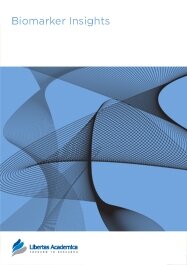

Publication Date: 09 Oct 2007
Journal: Biomarker Insights
Citation: Biomarker Insights 2007:2 385-401

Institut Pluridisciplinaire Hubert Curien, Département Sciences Analytiques, Laboratoire de Spectrométrie de Masse Bio-Organique, CNRS-ULP UMR 7178, ECPM, 25 rue Becquerel, 67087 Strasbourg Cedex 2, France.
Abstract: Mass spectrometry-based analyses are essential tools in the field of biomarker research. However, detection and characterization of plasma low abundance and/or low molecular weight peptides is challenged by the presence of highly abundant proteins, salts and lipids. Numerous strategies have already been tested to reduce the complexity of plasma samples. The aim of this study was to enrich the low molecular weight fraction of rat plasma. To this end, we developed and compared simple protocols based on membrane filtration, solid phase extraction, and a combination of both. As assessed by UV absorbance, an albumin depletion 99% was obtained. The multistep fractionation strategy (including reverse phase HPLC) allowed detection, in a reproducible manner (CV [1] 30%–35%), of more than 450 peaks below 3000 Da by MALDI-TOF/MS. A MALDI-TOF/MS-determined LOD as low as 1 fmol/μL was obtained, thus allowing nanoLC-Chip/ MS/MS identification of spiked peptides representing ∼10–6% of total proteins, by weight. Signal peptide recovery ranged between 5%–100% according to the spiked peptide considered. Tens of peptide sequence tags from endogenous plasma peptides were also obtained and high confidence identifications of low abundance fibrinopeptide A and B are reported here to show the efficiency of the protocol. It is concluded that the fractionation protocol presented would be of particular interest for future differential (high throughput) analyses of the plasma low molecular weight fraction.
PDF (553.61 KB PDF FORMAT)
RIS citation (ENDNOTE, REFERENCE MANAGER, PROCITE, REFWORKS)
BibTex citation (BIBDESK, LATEX)
XML
PMC HTML

I have had a great experience with submitting my cancer prognosis study to Biomarker Insights. The comments from reviewers and associate editor are high quality and insightful. Congratulations and keep up the good work.

All authors are surveyed after their articles are published. Authors are asked to rate their experience in a variety of areas, and their responses help us to monitor our performance. Presented here are their responses in some key areas. No 'poor' or 'very poor' responses were received; these are represented in the 'other' category.See Our Results
Copyright © 2013 Libertas Academica Ltd (except open access articles and accompanying metadata and supplementary files.)
Facebook Google+ Twitter
Pinterest Tumblr YouTube